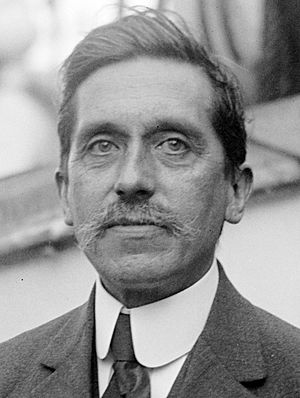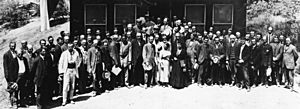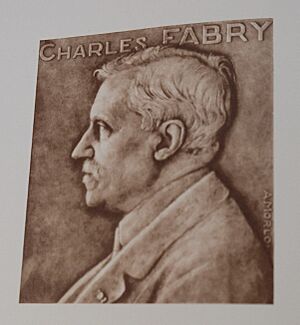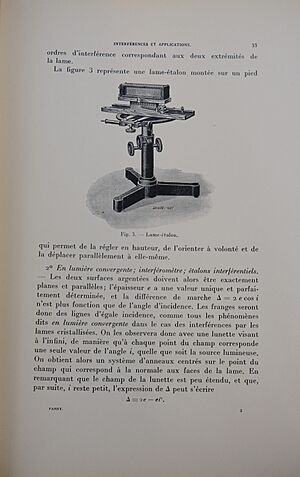Charles Fabry facts for kids
Quick facts for kids
Maurice Paul Auguste Charles Fabry
|
|
|---|---|
 |
|
| Born | 11 June 1867 Marseille, France
|
| Died | 11 December 1945 (aged 78) Paris, France
|
| Education | École Polytechnique University of Paris |
| Known for | Fabry–Pérot interferometer Ozone layer |
| Awards | Janssen Medal (1916) Rumford Medal (1918) Henry Draper Medal (1919) Franklin Medal (1921) Prix Jules Janssen (1929) FRS (1931) |
| Scientific career | |
| Institutions | Sorbonne University of Marseille École supérieure d'optique |
| Notable students | Jean Dufay Yves Rocard Bernard Lyot Yan Jici Sisir Kumar Mitra Anil Kumar Das Jean Cabannes Daniel Chalonge |
Maurice Paul Auguste Charles Fabry (born June 11, 1867 – died December 11, 1945) was an important French physicist. He is famous for his work with light and for helping to discover the ozone layer that protects Earth. He also invented a special tool called the Fabry–Pérot interferometer, which is still used today.
Contents
Early Life and Education
Maurice Fabry was born in Marseille, France, on June 11, 1867. He was a very bright student. He went to the École Polytechnique in Paris, which is a famous engineering school.
After that, he continued his studies at the University of Paris. In 1892, he earned his doctorate degree. His early work focused on something called "interference fringes." This work made him a leading expert in the study of optics (how light behaves) and spectroscopy (studying light to learn about materials).
In 1904, Fabry became a Professor of Physics. He taught at the University of Marseille for 16 years.
Key Discoveries and Inventions
Maurice Fabry made several big contributions to science.
Understanding Light Waves
He helped explain how light waves interact with each other. This is known as interference. Imagine two waves meeting; they can either combine to make a bigger wave or cancel each other out. Fabry's work helped us understand these patterns, called interference fringes.
The Fabry–Pérot Interferometer
In 1899, Fabry worked with his colleague Alfred Pérot. Together, they invented a special device called the Fabry–Pérot interferometer. This tool is used to measure very small distances and to study the properties of light with great accuracy. It's still an important tool in many scientific fields today.
Discovering the Ozone Layer
One of Fabry's most famous discoveries happened in 1913. Working with Henri Buisson, he discovered the ozone layer. This is a part of Earth's atmosphere that contains a lot of ozone gas. The ozone layer is super important because it protects us from harmful ultraviolet (UV) radiation from the sun. Without it, life on Earth would be very different!
Later Career and Recognition
In 1921, Fabry moved back to Paris. He became a Professor of General Physics at the Sorbonne, which is a very old and respected university. He also became the first director of the new Institute of Optics. This institute focused on teaching and research about light and optical instruments.
Later, in 1926, he also became a professor at the École Polytechnique, where he had studied. He was also the first general director of the Institut d'optique théorique et appliquée. This school is known for training experts in optics.
Fabry was highly respected by other scientists. He published 197 scientific papers and 14 books. He also wrote over 100 articles for the general public, explaining science in an easy-to-understand way.
Awards and Honors
Maurice Fabry received many awards for his important work:
- In 1918, he received the Rumford Medal from the Royal Society of London. This is a very prestigious award for contributions to physics.
- In 1919, he was given the Henry Draper Medal from the United States National Academy of Sciences.
- In 1921, he received the Franklin Medal from the Franklin Institute in the United States.
- In 1929, he was awarded the Prix Jules Janssen, which is the highest award from the French astronomical society.
- He was also elected to the French Academy of Sciences in 1927.
Fabry was also the President of the Société astronomique de France, the French astronomical society, from 1931 to 1933. His work continues to influence scientists today, especially in fields like astronomy and atmospheric science.
See also
In Spanish: Charles Fabry para niños




